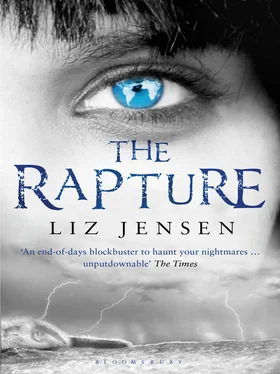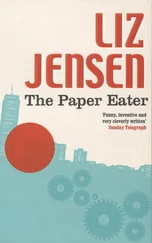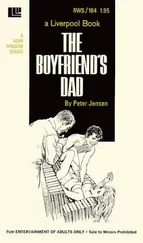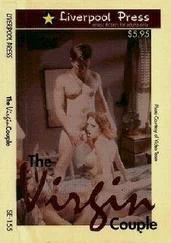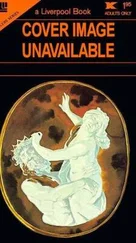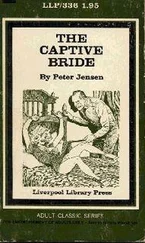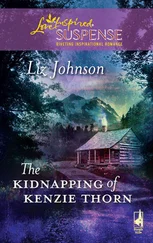‘Yes, it is. And also very private.’
I look at the splotch of green in Frazer Melville’s left iris. A tiny tropical fish that has gatecrashed his eye. It makes me long for him.
‘Gabrielle, I would never ask you about anything you’d rather not discuss. I hope you’ll trust me with that. We have plenty of time.’
‘I know. But the reason I mention it is because I think she did something similar with you: that’s my guess. Am I right? That she knew something personal?’
He nods miserably and looks at me in an unfathomable way, his eyes glassy from — what? Is it fear, confusion, guilt? Or something else?
‘You don’t have to tell me what it was,’ I say quickly. ‘But I want to establish — she unsettled you, didn’t she, by coming out with some personal information.’
‘Yes,’ he says. ‘She did.’
I wait for more. I am patient that way.
‘But it wasn’t about me,’ he mumbles. ‘It was about… another person. Someone I care about a lot. Who I wouldn’t want to hurt for the world.’
Despite my belief that it’s absurd to be jealous of someone’s past, I redden. Frazer Melville hasn’t told me a great deal about Melina. I know that when she left him for Agnesca, they didn’t speak for two years. I also know that later on, when he was working on a paper about marine landslides, and wanted her opinion as a geologist, he contacted her professionally, and they began an e-mail correspondence which has continued, sporadically, ever since. He speaks of her healthily, in the same affectionate way one speaks of a social misstep one has long since forgiven oneself.
‘Don’t tell me any more if you’d rather not,’ I say, taking his hand. ‘It’s just Bethany’s way of feeling powerful. I know how her mind works.’ We sit in silence for a moment, but then my curiosity — no, my jealousy — gets the better of me. ‘Was it something about you and Melina?’
He looks troubled. ‘No, it wasn’t.’
‘Oh.’ I am more relieved than I should be. And then puzzled. If not Melina, then who?
‘I don’t know how to say this.’ I sense exhaustion. Or something beyond it, in another dimension. ‘Gabrielle. Can’t you guess? It was about you.’ Suddenly I can’t find any words. And something’s lodged in my throat so I can’t tell him to stop, to shut up. Which I want and need him to. Now. Very urgently. ‘Gabrielle. I’m sorry. Bethany told me that when you had the accident, you were…’ He stops. He’s looking at me in a way that glitters. It’s agonising. For a light moment, I feel nothing except a swelling in my throat. ‘I’m sorry. You put me in such a difficult — Oh darling.’
A fleeting, almost hallucinatory relief. Then more pain, an exquisitely precise movement inside my ribcage, like the tightening of a ratchet.
I say, ‘Oh.’ And then my mouth shuts and I know it won’t open again, so there’s no point trying. When something has been said, even if the words are spoken silently, it can’t be unsaid.
‘Gabrielle? Are you OK?’
I nod. He takes both my hands. I know he’s looking at my eyes but I can’t meet his. I look at our hands instead — his freckled, mine olive — and remember my first meeting with Bethany. Something she said drifts up. Did you know that blood has its own memory? It’s like rock, and water, and air.
‘Is it true?’ he asks, finally. With effort, I shift my gaze to the wall. There’s a brown splotch on it. The shape is reminiscent of France or Spain. I wonder how it got there. Perhaps someone threw a cup of coffee. Decaf. Or perhaps tea. If there was sugar in it, there might be tiny crystals, clinging on. ‘Sweetheart. Speak to me.’
But I still can’t look at him. I stare at the French I Spanish splotch, wondering about the sugar, imagining the crystals, until its edges blur. He stands up. He lifts me out of the chair. He holds me to his chest, squeezing me. I can feel his heart banging, a steady hard hurting thump. My legs dangle like a puppet’s. Then he sits in his chair and takes me on to his lap, his arms straitjacketing me. There’s clearly no escape, either from him or from myself, so I lean my head back. His body is hot, comforting. I feel a weird kind of shame creep over me, like a sick desire.
‘She had no right to tell you.’
‘I’m so sorry.’
We don’t speak for a moment. Outside, a car alarm sets up. Around it, you can sense the night’s dark yawn, the brush of birds’ wings against hot pine needles, the delicate exhalations of tarmac.
I say, ‘I was going to call him Max.’
‘HOW—’
‘Twenty-eight weeks. They can be born alive at that stage. But he wasn’t.’
If I allow myself to cry, I will never stop.
So I don’t, and we sit like that for a while, I don’t know how long, and then he carries me down the stairs and drives us back to my home through the warm night, windows open to the hot, scent-laden air. In his arms, in bed, I give in to it. Frazer Melville knows there’s nothing to say, so he doesn’t try. But he holds me all night. And that is something.
In the morning we watch the news. The pall of dust is clearing to reveal a choked wasteland, desolate as a hundred thousand Ground Zeros, dwarfing anything I have seen or could have imagined, a smoking, smouldering bleakness that stretches for kilometre upon kilometre, with odd pockets of normality on which the sun shines: a playing field, a rind of park, a sparkling lake sprinkled with painted pedalos. Mosques, their domes popped open like puffballs, gape up at the sky. Thousands of people are entombed in rubble. Soldiers in masks search for survivors, picking their way through jagged promontories of reinforced cement with heat detectors and sniffer dogs.
I wonder what goes through Bethany Krall’s mind when she watches the aftermath of a horror she so clinically predicted. Does she feel powerful, proud, omniscient, invincible? Or in a corner of her psyche, is she scared out of her wits? And Dr Ehmet, scouring name-lists, tent encampments, home-made posters and Red Cross centres for his family, one of millions? I do not imagine this man, with his bad haircut and his brave ‘heh’ and his Hegel quotations, being well equipped for the task he has set himself, but he will do it anyway. And his broken heart will join all the other hearts smashed in seconds, for no reason that makes any sense to anyone.
In a few days, there will be stories of freak survivals. A child will crawl unscathed from an impossibly narrow fissure in the ground. An old lady will recount the tale of a jar of mulberry jam which saved her life when she lay with her broken legs trapped under a beam. Then fast-forward to the time, not so far from now, when the bereaved have trudged away with the objects they hold dear — a photograph, a toy, a cactus, a teapot, a copy of the Koran — leaving the husk of Istanbul to stand and then fall: a ghost city, a modern Angkor Wat. Before long, nature will stake its claim. Insects, pigeons, squirrels, lizards, snakes and blown sand will overtake the ruins of flats and travel agents’ offices and schools and department stores. Morning glory, cyclamen and all shades of bougainvillaea will writhe their way through the remains of tower blocks and climb up the rusted steel reinforcements of hospitals to bloom in bright carpets; poppies and bindweed and rosemary and lemongrass will deck splintered wood and smashed concrete with verdure; acacia trees and chinaberries will colonise the cracks, splitting tarmac to conjure the worst kind of beauty: the kind that celebrates human collapse.
When something has been tortured it can never be itself again. Be it a spine or a heart. Nerve-endings and longings have died, impulses have changed, sensitivities have found new routes of expression, specific muscle movements and emotional urges have calcified. So although I am beginning to diagnose in myself the rapid growth of a mental symptom, triggered by my recent closeness to the freckled physicist, I do not succumb to the comforts it could offer me. I recognise it for what it is: a false sensation. Like the neurological swarming in my legs, this symptom — some would call it love — is phantom evidence of an emotional indulgence my circumstances deny me.
Читать дальше
